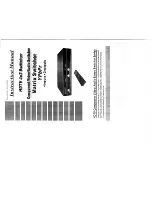
HP Hub-8TXE Installation and Reference Guide
Hardware Reference
4-3
Statistical Display for System Performance
Utilization
- (
Utilization%
) The statistical indicators
show the percentage of valid data
passing through all ports compared to overall network bandwidth (updated every
0.5 seconds). There are 5 LEDs representing the percentage of network utilization.
The corresponding LEDs light up to show that the utilization of LAN bandwidth
has reached this level. When active, these LEDs behave like a stereo’s equalizer
display.
For example, if network utilization reaches 1%, the LED labeled 1% will light up.
However, if network utilization rises above 1% (e.g., 30%), the LED labeled 30
and all the other LEDs before it (i.e., 1, 5 and 15) will also light up in rapid
succession. These indicators monitor the share of valid network frames handled
by the hub within a 100 Mbit/s bandwidth. They provide a quick way to monitor
the current traffic load relative to the network’s capacity.
Collision
- (
Collision%
) The statistical indicators
show the percentage of packet
collisions occurring out of the total packets transmitted by the hub. Collisions
occur when two or more devices connected to a hub attempt to transmit data
simultaneously on the network. When a collision occurs, devices pause and then
re-transmit after a pseudo-random wait period. Because wait periods differ among
devices, successive collisions become increasingly improbable.
The Collision LEDs assist the network manager in monitoring the percentage of
packet collisions occurring relative to the total packets transmitted by the hub.
When collisions reach a level marked on the front panel display, the correspond-
ing LED lights up. For example, if packet collisions reach 1%, the LED labeled
1% will light up. However, if collisions go beyond 1% (e.g., 15%), the LED
labeled 15
+
% and all the other LEDs before it (i.e., 1, 3, 5 and 10) also light up
in rapid succession.
















































